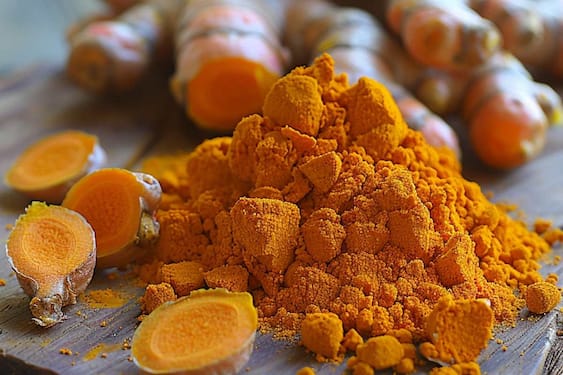10 Incredible Ways Turmeric Can Improve Your Health Starting Today
Turmeric, primarily due to its active compound curcumin, offers numerous health benefits. It has strong anti-inflammatory and antioxidant properties, supports heart health, boosts brain function, and aids in digestion. Turmeric may also help manage diabetes, improve skin health, and boost the immune system.

Turmeric is a potent natural remedy known for its anti-inflammatory and antioxidant properties. Curcumin, its key compound, helps reduce inflammation, improve brain function, and protect against heart disease by enhancing endothelial function. It's also beneficial for digestive health, easing conditions like indigestion and inflammatory bowel diseases. Turmeric supports joint health by alleviating arthritis symptoms and has shown promise in cancer prevention by inhibiting tumor growth. Additionally, turmeric can help regulate blood sugar levels in diabetics and improve immune function, making the body more resilient to infections.
1. Powerful Anti-Inflammatory Properties
Curcumin, the main active compound in turmeric, is known for its strong anti-inflammatory effects. Chronic inflammation is a key contributor to many diseases such as arthritis, heart disease, and cancer. Curcumin works by inhibiting molecules involved in the inflammatory process, such as NF-kB, thus reducing inflammation in the body.
2. Rich in Antioxidants
Turmeric is packed with antioxidants, particularly curcumin, which helps neutralize harmful free radicals in the body. Free radicals are unstable molecules that can damage cells and contribute to aging and the development of diseases like cancer. By neutralizing these molecules, turmeric helps protect the body from oxidative stress and cellular damage.
3. Improves Brain Function and Lowers Risk of Brain Diseases
Curcumin has been shown to boost levels of Brain-Derived Neurotrophic Factor (BDNF), a protein that supports the growth and survival of neurons. Low levels of BDNF are linked to brain disorders such as Alzheimer's disease and depression. By increasing BDNF, turmeric can help improve cognitive function and reduce the risk of neurodegenerative diseases.
4. Supports Joint and Bone Health
Turmeric is particularly beneficial for people with joint issues such as osteoarthritis and rheumatoid arthritis. Its anti-inflammatory properties help alleviate pain and swelling associated with arthritis. Studies have shown that curcumin can be as effective as some anti-inflammatory drugs in reducing symptoms of joint inflammation without the side effects of medications.
5. Boosts Heart Health
Turmeric has several benefits for heart health, primarily by improving the function of the endothelium, the lining of the blood vessels. Curcumin improves endothelial function, which regulates blood pressure and blood clotting. Additionally, turmeric's anti-inflammatory and antioxidant properties help reduce the risk of heart disease by preventing arterial plaque buildup and reducing oxidative damage.
6. Aids in Digestion and Gut Health
Turmeric has been used in traditional medicine to treat digestive issues such as bloating, gas, and indigestion. Curcumin stimulates the production of bile, improving digestion and reducing symptoms of indigestion. It also has anti-inflammatory properties that can help treat inflammatory bowel conditions such as ulcerative colitis and Crohn's disease.
7. Helps Manage Type 2 Diabetes
Curcumin has shown potential in lowering blood sugar levels and improving insulin sensitivity, making it beneficial for people with type 2 diabetes. It reduces inflammation and oxidative stress, which are major contributors to insulin resistance. Some studies suggest that turmeric can help regulate glucose metabolism, thereby supporting overall blood sugar management.
8. Supports Skin Health
The antioxidant and anti-inflammatory properties of turmeric make it an effective remedy for various skin conditions, including acne, eczema, and psoriasis. Curcumin can help reduce redness, swelling, and irritation, promoting a clearer and healthier complexion. Additionally, turmeric may speed up wound healing and reduce the appearance of scars.
9. Potential Cancer Prevention
Curcumin has been extensively studied for its potential role in preventing and treating cancer. It has been found to reduce the growth of cancer cells, inhibit the spread of tumors, and even promote the death of cancerous cells (apoptosis). While more research is needed, turmeric may help reduce the risk of several types of cancer, including colorectal, breast, and prostate cancer.
10. Boosts Immune System
Turmeric helps modulate the immune system, enhancing the body's defense mechanisms. It has been shown to increase the activity of immune cells, such as T cells, B cells, and natural killer cells, which play a crucial role in fighting off infections. Regular consumption of turmeric can help improve immune response, making the body more resilient to infections and illnesses.
In conclusion, turmeric is a powerful natural remedy with numerous health benefits, largely due to its active compound curcumin. Its anti-inflammatory, antioxidant, and immune-boosting properties make it valuable for supporting overall health and preventing a variety of diseases.
